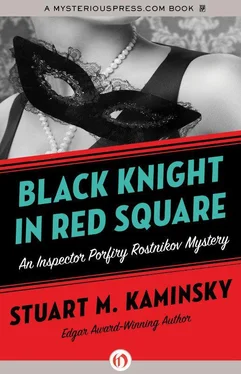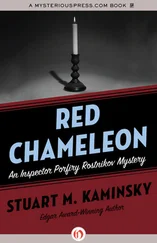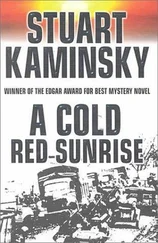Stuart Kaminsky - Black Knight in Red Square
Здесь есть возможность читать онлайн «Stuart Kaminsky - Black Knight in Red Square» весь текст электронной книги совершенно бесплатно (целиком полную версию без сокращений). В некоторых случаях можно слушать аудио, скачать через торрент в формате fb2 и присутствует краткое содержание. Год выпуска: 1983, ISBN: 1983, Издательство: Fawcett, Жанр: Полицейский детектив, на английском языке. Описание произведения, (предисловие) а так же отзывы посетителей доступны на портале библиотеки ЛибКат.
- Название:Black Knight in Red Square
- Автор:
- Издательство:Fawcett
- Жанр:
- Год:1983
- ISBN:9780804104050
- Рейтинг книги:5 / 5. Голосов: 1
-
Избранное:Добавить в избранное
- Отзывы:
-
Ваша оценка:
- 100
- 1
- 2
- 3
- 4
- 5
Black Knight in Red Square: краткое содержание, описание и аннотация
Предлагаем к чтению аннотацию, описание, краткое содержание или предисловие (зависит от того, что написал сам автор книги «Black Knight in Red Square»). Если вы не нашли необходимую информацию о книге — напишите в комментариях, мы постараемся отыскать её.
Black Knight in Red Square — читать онлайн бесплатно полную книгу (весь текст) целиком
Ниже представлен текст книги, разбитый по страницам. Система сохранения места последней прочитанной страницы, позволяет с удобством читать онлайн бесплатно книгу «Black Knight in Red Square», без необходимости каждый раз заново искать на чём Вы остановились. Поставьте закладку, и сможете в любой момент перейти на страницу, на которой закончили чтение.
Интервал:
Закладка:
Iosef looked far more like his mother’s side of the family than his father’s which, in the mind of Galinarov who knew the histories of every man under his command, made the younger Rostnikov a Jew. Galinarov had nothing in particular against the Jews, just as he had nothing against the Mongols and Tatars who were forming a larger and larger percentage of the militia. That worried Galinarov and others above him. There had always been a rather high percentage of Jews in the Russian army, going back to the days of the czars. The reason was simple: Jews could not buy their way out, and it was believed that an important function of the army was to control and contain the Jews.
During the rule of the czars, soldiers would go to the Jewish villages once a year to round up their quota of boys twelve and older. The boys would serve for a period of five to forty years. The longer they served, the more likely they were either to die or to accept Christ, though the Jews had proved stubborn, and deaths had always outnumbered conversions among Hebrew soldiers.
Since the Revolution, the goal of the military was no longer to convert the Jewish conscripts to Christianity or even to communism, since the majority of the Jews seemed to embrace socialism with the great hope that it would ease their lot in life. No, the roots of the army’s hostility to the Jews were deeply anchored in the Russian psyche, nurtured by suspicion of Jewish separateness and intellectualism.
“Rostnikov,” said Galinarov as the young corporal reached the door.
“Yes, Comrade,” Rostnikov answered without turning, which was a mild but obvious insult.
“Turn around,” said Galinarov.
Iosef turned around and faced the officer, who was almost exactly a year younger than he was.
“Calls to this station by relatives are, as you know, discouraged except in emergencies,” said Galinarov, tapping his fingertips together.
“I know, Comrade,” Iosef said.
“And?” prompted Galinarov.
“Nothing further,” Iosef said. “I did not tell my parents to call. I have informed them of the order. You can, of course, call them yourself and so inform them. You can reach my father at home now or at his office tomorrow. His number is-”
“I know he is a policeman,” said Galinarov through his teeth.
“A chief inspector,” Iosef amplified, adding a gentle smile.
“Are you trying to impress me with your family’s position?” Galinarov said, standing. He was in full uniform, his collar buttoned, clean and shaved as always.
“No, Comrade,” said Iosef. “I was simply providing you with adequate information with which you could make a decision on the proper course of action.”
“You have a tendency to say more than is good for you, Rostnikov.”
Iosef nodded. “A habit I acquired from my father,” he explained.
“A racial quality,” Galinarov prodded.
“Perhaps, Comrade,” Iosef said agreeably. “But it is my mother who is discreet, and she is the one who is Jewish. My father comes from a long line of Russian Christian peasants, like your father.”
“You will not get very far in this army, Rostnikov,” Galinarov said, tapping his fingers nervously on the desk top.
“I do not expect to, Comrade. My goal is to do my job, serve my time with honor, and return to civilian life where I can make my contribution to the state.”
“You don’t really know how difficult things can be for you, Rostnikov,” Galinarov went on.
“They were quite difficult in Afghanistan during the winter,” Rostnikov responded. “The man you replaced was killed there, as you know. I realize that you have not had the privilege of serving in combat for the nation, but-”
Galinarov moved from the desk in three boot-clapping steps and faced Rostnikov, his nose inches from that of his subordinate.
“To say that you will regret this conversation is an understatement to match Napoleon’s comment that he would destroy Russia in two weeks.”
Galinarov’s breath was surprisingly minty, to cover the smell of Madeira wine, which everyone knew was the lieutenant’s constant companion. Rostnikov was also quite sure that Napoleon had said nothing of the kind. It was a typical Soviet ploy. People were forever quoting Lenin, much of the time with a great deal of creativity, knowing that even scholars had a difficult time identifying quotations from the mass of Lenin’s writing and speeches.
Rostnikov couldn’t resist joining the game.
“I believe it was Hitler who said that,” he said as innocently as he could, though he had no idea if Hitler had said any such thing.
“Get out,” Galinarov said, a faint tic quivering above his right eye.
Rostnikov turned and left as smartly as he could. He knew that Galinarov was sorely tempted to test him physically, but both Rostnikov and Galinarov knew that Iosef was stronger, faster, and a good deal smarter. And that was part of the problem, along with the fact that Rostnikov found it very difficult to conceal his superiority.
In the hallway with the door shut behind him, Iosef looked at his hands, which were quite steady. He had to admit that he really enjoyed such confrontations. He had been honed on them over meals at home and had learned to consider such verbal jousting not only a fact of Soviet life but one of its intellectual joys. Actually, Galinarov could make his life at the barracks near Kiev quite miserable and would probably do so, but soon Iosef would inherit the secret rock, the rock that was always passed to the man with the shortest time remaining in service. The short-timers’ rock, painted red and quite smooth, would rest in the pocket of the fortunate holder, to be passed ceremoniously to the next man when it was time for the holder to go.
The procedure had been part of Rostnikov’s company for years, and it had been a lighthearted ritual until the return from Afghanistan. The expedition had brought the men-those who survived-close together.
As he returned to his barracks room where Misha and Rolf were waiting for him with a chess game, Iosef had two concurrent thoughts. First, he thought it might be interesting to be a policeman as his father was and spend much of the time confronting people as he had confronted Galinarov. He had never seriously considered that before, and though he was trained as a mechanical engineer, he wondered if his father could make some arrangement for him to join the MVD. The second thought was less specific but troublesome: What, in fact, had prompted his parents to call him?
THIRTEEN
James Willery sat silently on the floor, his legs crossed, staring at the wall. Several students came to look in on him and discuss the controversy that had arisen after the screening of To the Left . One of them managed to get a grunt out of him shortly before two o’clock. Half an hour later Alexander Platnov, who was rather enjoying the silence, felt obliged to offer his guest something to eat. Willery rejected the soup but accepted a piece of coarse white bread, which he ate slowly and silently.
“What’s wrong with him?” asked a young woman with long dark hair when Platnov went out in the hall to use the toilet.
“I don’t know.” Platnov shrugged, quite happy to talk to the woman who, until now, had acted as if Platnov was not a member of the human race. “He was in India a few years ago. I think he may be meditating.”
The young woman looked toward the room. “He is a very profound filmmaker,” she said.
He is, thought Alexander Platnov, an ass. However, he said, “Yes, yes, he is. And I’ve learned much from him in the last few days.”
The woman, who was named Katya, looked at him seriously with intense gray eyes.
“I’d very much like to know what he has shared with you, Comrade,” she said.
Читать дальшеИнтервал:
Закладка:
Похожие книги на «Black Knight in Red Square»
Представляем Вашему вниманию похожие книги на «Black Knight in Red Square» списком для выбора. Мы отобрали схожую по названию и смыслу литературу в надежде предоставить читателям больше вариантов отыскать новые, интересные, ещё непрочитанные произведения.
Обсуждение, отзывы о книге «Black Knight in Red Square» и просто собственные мнения читателей. Оставьте ваши комментарии, напишите, что Вы думаете о произведении, его смысле или главных героях. Укажите что конкретно понравилось, а что нет, и почему Вы так считаете.












